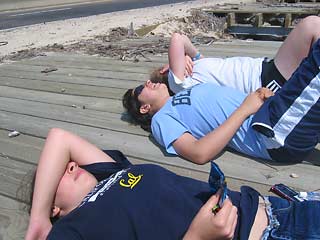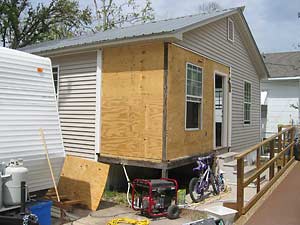UC Berkeley Web Feature
Spring break in Biloxi
Hope amid disaster, diversity amid prejudice, and mold amid all
 This is the second in a series of dispatches from Judy Wang (left), a UC Berkeley third-year double major in molecular and cell biology and psychology. She's on spring break in Mississippi, helping with Hurricane Katrina relief efforts as part of the campus's Alternative Breaks program.
This is the second in a series of dispatches from Judy Wang (left), a UC Berkeley third-year double major in molecular and cell biology and psychology. She's on spring break in Mississippi, helping with Hurricane Katrina relief efforts as part of the campus's Alternative Breaks program.
By Judy Wang | Thursday, March 30, 2006
Day 6
BILOXI, Miss. — The past couple days have flown by quickly. We are awakened each day at approximately 7 a.m. for breakfast and are out the door by 8 a.m. for whatever tasks we have been assigned. Our days end at approximately 4 p.m. with dinner at around 6, an all-volunteer meeting immediately following dinner, quiet hours beginning at 9:30 and lights out at 10.
 A trio of Berkeley volunteers take a breather on the Biloxi coastline during a hard day of mold removal. (Judy Wang photos) |
For the past week, we have been on teams with Hands On USA volunteer leaders, involved in such activities as surveying the local community and door-to-door advertising for a community input meeting; more interior and mold house work; and tutoring kids at a local elementary school. Interior and mold work are the two areas that need the most help. Mold work involves scraping the mold off of all the wooden surfaces in the already gutted-out houses, vacuuming all of the horizontal wooden surfaces in the house (floors, crossbeams and rafters), and wiping the wood with a strong disinfectant to prevent new mold from growing.
At least half of us have done three days of mold work, and with tomorrow being our last volunteer day in Biloxi, UC Berkeley students have been assigned to three out of four mold teams for tomorrow. It's not the most glamorous job in the world, but we're happy to be able to help out in areas that are in need.
Approximately six to seven UC Berkeley students have been in Bernice, La., close to the Louisiana/Arkansas border, since Tuesday morning working with a non-profit book organization to help it sort books for the devastated Gulf Coast region, and they will be returning to Biloxi tonight.
On Monday of this week, we were fortunate to attend a panel discussion at Tulane University called "Loss, Lessons & Hope for the Future: Voices of Hurricane Katrina." Among those who spoke were New Orleans-area university students involved in social justice, high school outreach and hurricane relief efforts, along with a former resident of St. Bernard's Parish now involved in relief and recovery efforts for New Orleans. Topics discussed included a hopeful outlook for the future and the ineptitude of the government in preparing for a natural disaster of such magnitude as Katrina.
For me, the past week has been mostly mold work, but I did get a much needed break from the physical labor by volunteering time at Pass Road Elementary, the local elementary school, with five other UC Berkeley students. Unfortunately, the day I was there we weren't able to tutor any of the students and instead helped the school librarian sort through the thousands of books received from around the country. We were, however, treated to a special presentation of student skits inspired by the readings of Dr. Seuss and a high school "Seussified" version of Shakespeare's Romeo and Juliet. The skits were entertaining, and our group noted afterwards that it felt so good to hear the kids laugh.
 Although this house had a family living inside, and they were about to begin rebuilding work, some of its rooms were completely covered in mold. |
The week has been an incredible learning experience, mostly through good, hands-on experiences with the community, but also in ways that have been emotionally draining for all of us. It's true what many community members have been saying — Katrina has brought out the best in people, but it has also brought out the worst. We have heard stories every night, especially from those who went out surveying the community, about encounters with local residents who have been taken advantage of by their own community and their own government. We also are increasingly hearing stories from our own group members — myself included — who have encountered racial prejudice and discrimination on our trip.
These stories woke all of us up, and being from California, shattered a lot of our notions about the world. They really hit close to home and, in a way, reminded us about how different Berkeley and the Bay Area are are compared to Mississippi and the rest of the Deep South. Members of our group have talked about how hurt and angry they were that some members of the community refused to look them in the eye.
As for me, someone told me that I had a very "Anglicized" name and asked me, "When did you arrive in the States?" I didn't know what to feel and felt offended, confused and embarrassed all at once. Being raised in West San Jose, a fairly affluent area with a large Asian immigrant majority, I had never been exposed to this type of racial ignorance before.
One thing that did cheer all of us up somewhat throughout the week was the hope and the inspiration that the kids at Pass Road Elementary gave us. My group was able to interact with the kids during their lunch hour, and we gave them high-fives and played games with them. One of our fervent hopes is that the diversity of our group and of other volunteers here in Biloxi will leave an impact on the kids.
Our diverse group of Cal students may not necessarily be able to change the mindsets of the older generation that has grown up with the ignorance of the generations before them, but we hope that, with the relief and recovery efforts of hundreds of diverse volunteers in the region, the kids growing up here post-Katrina will be able to learn about tolerance and most importantly, acceptance.

